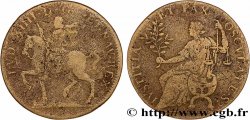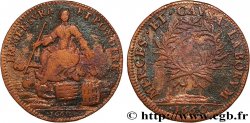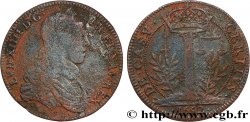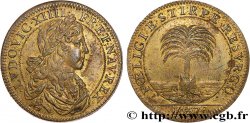fjt_049323 - LOUIS XIV THE GREAT or THE SUN KING Pyramide élevée à Rome 1664
Not available.
Item sold on our e-shop
Price : 42.69 €
Item sold on our e-shop
Price : 42.69 €
Type : Pyramide élevée à Rome
Date: 1664
Metal : red copper
Diameter : 41 mm
Catalogue references :
Obverse
Obverse legend : LUDOVICUS XIIII . REX CHRISTIANISS.
Obverse description : Buste de Louis XIV à droite, signé I. MAVGER. F.
Obverse translation : (Louis XIV, roi très chrétien).
Reverse
Reverse legend : OB NEF. SCELUS A CORSIS EDIT. IN ORAT. REG. FR.
Reverse description : La ville de Rome, sous la figure d’une femme assise, tenant un javelot et un bouclier sur lequel on lit : ROMA. A droite la nouvelle pyramide ; à l’exergue : M. DC. LXIV.
Commentary
En août 1662, les gardes de l’ambassadeur du roi de France à Rome eurent une querelle avec les gardes corses du pape. Du côté français, il y eut des blessés et même un mort. Comme la cour de Rome hésitait à présenter ses excuses, l’ambassadeur quitta la ville. Louis XIV, de son côté, ordonna le nonce apostolique de quitter la cour et occupa Avignon et le Comtat Venaissin. une guerre semblait éclater d’un moment à l’autre.
Finalement, une paix fut conclue entre le pape Alexandre VII et le roi de France. Louis XIV restituait le Comtat et le pape en échange offrait comme réparation le renvoi de la garde corse, une déclaration d’excuses du nonce et l’érection d’une pyramide à Rome, en mémoire à ces excuses.
La pyramide fut érigée au commencement de l’année 1664. Le 29 juillet de la même année, le neveu du pape, le cardinal Chigi, fut reçu en audience dans la chambre du roi et présenta les excuses de Rome (médaille 79). Le pape Clément IX, le successeur d’Alexandre VII, désirait la destruction de la pyramide, ce témoignage de l’humiliation papale. Louis XIV finit par donner son consentement et la pyramide fut détruite en 1668.
Finalement, une paix fut conclue entre le pape Alexandre VII et le roi de France. Louis XIV restituait le Comtat et le pape en échange offrait comme réparation le renvoi de la garde corse, une déclaration d’excuses du nonce et l’érection d’une pyramide à Rome, en mémoire à ces excuses.
La pyramide fut érigée au commencement de l’année 1664. Le 29 juillet de la même année, le neveu du pape, le cardinal Chigi, fut reçu en audience dans la chambre du roi et présenta les excuses de Rome (médaille 79). Le pape Clément IX, le successeur d’Alexandre VII, désirait la destruction de la pyramide, ce témoignage de l’humiliation papale. Louis XIV finit par donner son consentement et la pyramide fut détruite en 1668.








 Report a mistake
Report a mistake Print the page
Print the page Share my selection
Share my selection Ask a question
Ask a question Consign / sell
Consign / sell
 Full data
Full data









